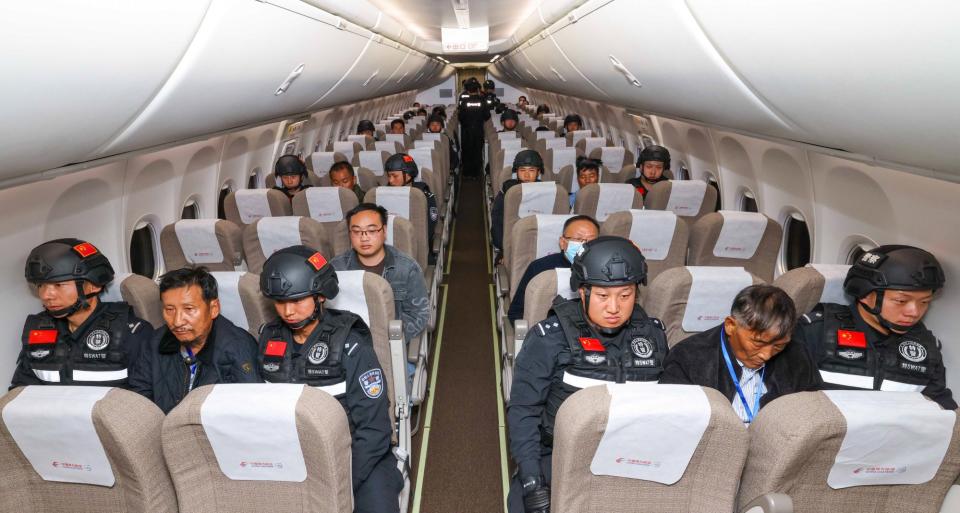'Extremely heinous': Myanmar hands over 10 leading cyber scam suspects to China
Myanmar authorities handed over 10 alleged cyber scam suspects to China, a move Beijing hailed as a "historic and significant" moment since launching a sweeping crackdown against online fraud last year.
They were extradited to China on Tuesday and include six accused ringleaders of cybercrime gangs and four others who are considered "major criminal suspects", according to the Chinese Ministry of Public Security.
The suspects include Bai Suocheng, former chairman of northern Myanmar's Kokang self-administered zone, and his son and daughter. Members of two other alleged crime families - the Wei and Liu families - and Xu Laofa, who is accused of leading another fraud gang, were also extradited, the ministry said on Tuesday.
Do you have questions about the biggest topics and trends from around the world? Get the answers with SCMP Knowledge, our new platform of curated content with explainers, FAQs, analyses and infographics brought to you by our award-winning team.
The 10 suspects were named to Beijing's wanted list in December, with authorities offering cash rewards of up to 500,000 yuan (US$70,000) for any information leading to the arrests.
The ministry said the criminal enterprises "vigorously organised and established fraudulent hideouts, openly armed themselves to protect the fraud activities, and relentlessly carried out telecommunications network fraud crimes against Chinese citizens".
They are accused of "extremely heinous" crimes, including intentional murder, intentional injury and illegal detention, it said.
Since the two countries launched the crackdown in September, Myanmar has handed over 44,000 fraud suspects to China, including 171 core members and "financiers" of the criminal enterprises.
The ministry said the progress reflected the "historic and significant" result of its efforts in combating these crimes and dealt a "heavy blow to arrogant overseas fraud syndicates".
Beijing has increased measures to tackle cyber fraud as cases have gained notoriety online and the public has grown increasingly concerned about the scams, which often lure Chinese nationals to northern Myanmar, where they are then trapped and forced to work for criminal gangs.
Many posts on Chinese social media describe how people were tricked and then coerced into taking part in investment fraud, romance scams and extortion on behalf of the syndicates.
The money generated from the scams is often diverted through casinos and converted into hard-to-trace cryptocurrencies. Beijing has responded by targeting Chinese fugitives believed to be at the apex of the criminal enterprises.

The cyber fraud suspects are escorted by Chinese police on a charter flight from Myanmar to China on Tuesday. Photo: Xinhua alt=The cyber fraud suspects are escorted by Chinese police on a charter flight from Myanmar to China on Tuesday. Photo: Xinhua>
In November, Beijing arrested members from the Ming crime family, whose leader owned the infamous Crouching Tiger Villa, a large telecoms scam compound in Kokang.
The head of the family, Ming Xuechang, also known as Myin Shaw Chang, died in a suspected suicide, according to Chinese authorities.
China's assistant foreign minister Nong Rong visited Myanmar in November and called for joint efforts in tackling cross-border crime and maintaining border stability.
Since October, Myanmar's ruling military has faced attacks in the country's borderlands as an alliance of ethnic minority insurgent groups and pro-democracy fighters have joined forces to challenge the junta's rule.
This article originally appeared in the South China Morning Post (SCMP), the most authoritative voice reporting on China and Asia for more than a century. For more SCMP stories, please explore the SCMP app or visit the SCMP's Facebook and Twitter pages. Copyright © 2024 South China Morning Post Publishers Ltd. All rights reserved.
Copyright (c) 2024. South China Morning Post Publishers Ltd. All rights reserved.

 Yahoo Finance
Yahoo Finance 